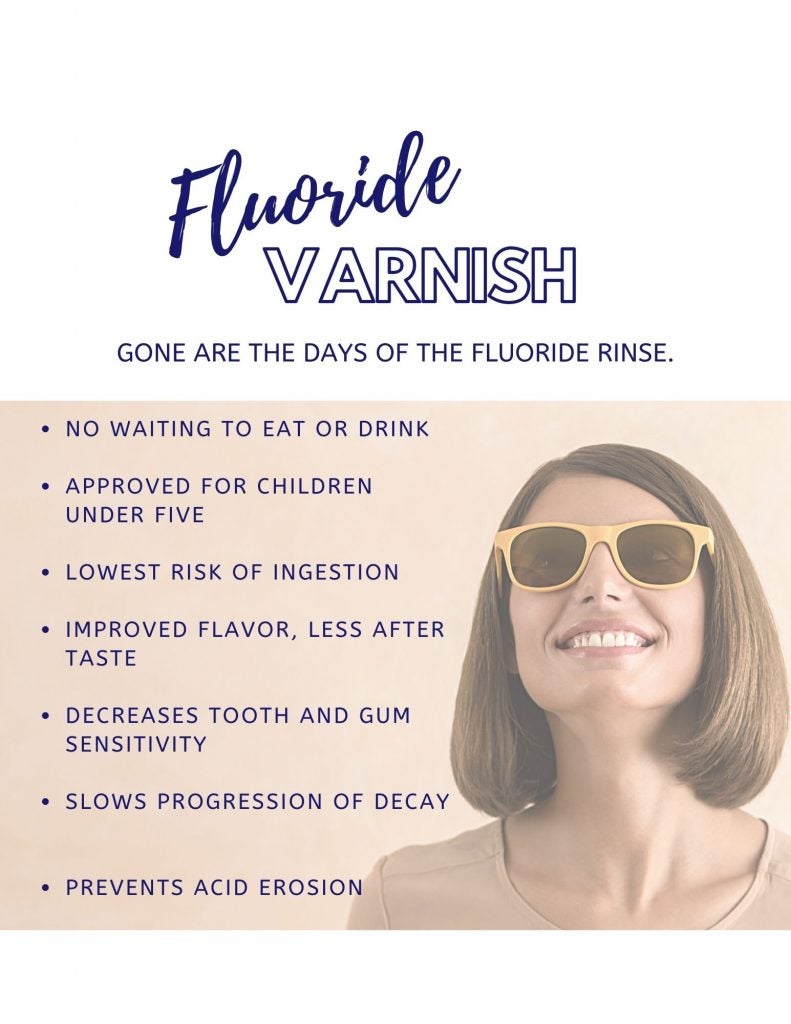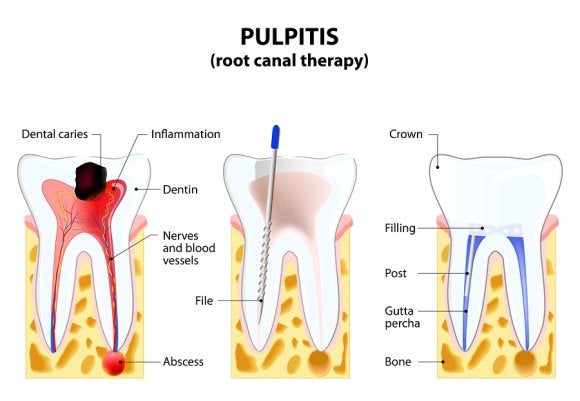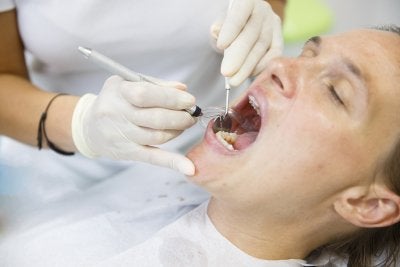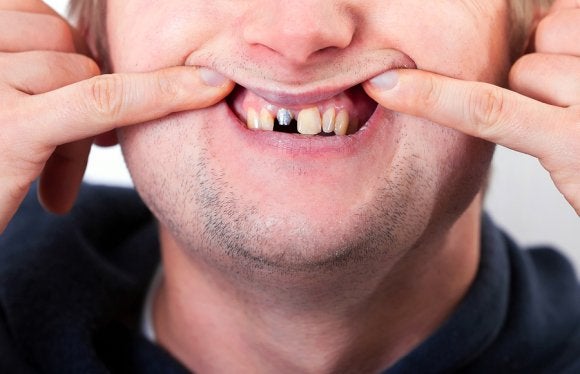-
Elevating Dental Care: Introducing Fluoride Varnish to Our Standard of Care for Adult Patients
Introduction: At Your Smile Bel Air Family Dentistry, we are committed to providing our adult patients with outstanding dental care that goes beyond expectations. We are excited to announce the formal inclusion of fluoride varnish* as a core component of our standard of care. In this blog post, we will introduce fluoride varnish, highlight its advantages over other fluoride treatments, and emphasize its low risk of ingestion and convenience for our valued adult patients.
Understanding Fluoride Varnish: Fluoride varnish is a highly effective preventive treatment that offers targeted protection against tooth decay and enamel erosion. It is a concentrated gel-like substance that contains a higher concentration of fluoride compared to other fluoride treatments. Here’s why we have chosen to incorporate fluoride varnish into our standard of care for adults:
1. Enhanced Protection: The application of fluoride varnish forms a durable coating on the teeth, acting as a physical barrier against acid attacks and enamel demineralization. This protective layer significantly reduces the risk of tooth decay and helps maintain strong, healthy teeth.
2. Low Risk of Ingestion: We understand the concerns surrounding fluoride ingestion, especially for adult patients. With fluoride varnish, the risk of ingestion is minimal due to its fast-drying nature. The varnish adheres to the teeth quickly, minimizing the chances of swallowing any significant amount.
3. Convenience for Adult Patients: Fluoride varnish offers unparalleled convenience, making it an ideal choice for our adult patients. The application process is simple and non-invasive, taking only a few minutes during your regular dental visit. Unlike other treatments, there’s no need to wait for any specific amount of time before eating or drinking. You can resume your daily activities immediately after the application.The Benefits of Fluoride Varnish for Adults: By including fluoride varnish with our routine dental cleanings, we are prioritizing the oral health and well-being of our adult patients. Here are the key benefits you can expect:
1. Reduced Risk of Tooth Decay: Fluoride varnish provides a concentrated and long-lasting fluoride release that effectively strengthens tooth enamel and helps prevent cavities.
2. Protection against Enamel Erosion: The protective barrier created by fluoride varnish shields the teeth from acid attacks, reducing the risk of enamel erosion and maintaining a healthy smile.
3. Alleviation of Tooth Sensitivity: Fluoride varnish can help alleviate tooth sensitivity by sealing exposed dentin and reducing discomfort.
4. Tailored Treatment for High-Risk Individuals: For adults with a higher risk of tooth decay or specific oral health conditions, fluoride varnish can be applied directly to targeted areas that require additional protection, such as areas showing early signs of decay or exposed root surfaces.Conclusion: With the addition of fluoride varnish to our standard of care, we are excited to offer our adult patients an enhanced level of protection against tooth decay and enamel erosion. Fluoride varnish is a safe, convenient, and highly effective preventive treatment that minimizes the risk of ingestion while delivering targeted benefits. Experience the difference of our comprehensive dental care by scheduling your next appointment today.
*While adult fluoride varnish has been established as a standard of care at our dental office, it is important to note that coverage for this treatment may vary among dental insurance plans. We recommend patients to contact their dental insurance provider for detailed information regarding coverage, benefits, and any associated costs. Please be aware that any fees related to fluoride varnish treatment are the responsibility of the patient. Our team is available to assist you in addressing any queries or concerns you may have regarding insurance coverage.
-
Let’s Take Prevention to the Next Level

-
Preparing for Your Child’s First Dentist Appointment
Children should have their first visit to a dental office once a tooth comes in or before their first birthday to allow dentists to check the growth and development of their teeth. This initial visit is important because, as soon as her first tooth appears, it can develop a dental cavity. When you are scheduling the appointment with a pediatric dentist in Bel Air, MD, try to select a time when your child tends to be more cooperative. For many children, morning appointments work best.
On the day of her appointment, provide her with a light meal, but avoid giving her snacks in the waiting room, as this can make the examination more difficult since she is likely to have food on her teeth. Finally, if you have dental insurance, contact your provider to ensure that your child is included in the plan before her pediatric dentist appointment.
-
Helping Your Kids Avoid Cavities
As a parent, it is important to teach your children proper oral health habits and hygiene. While cavities may be an unavoidable problem for some families, there are steps that you can take to help prevent a dental cavity in your child’s smile. A kid’s dentist in Bel Air will be able to gently clean your child’s teeth and check for the early signs of decay. Your pediatric dentist can also instruct your son or daughter on proper brushing and flossing techniques. To help you avoid the stress of a dental cavity, here is a look at some tips for helping your kids avoid tooth decay.

Brush and Floss Regularly
One of the most effective measures for preventing tooth decay is to encourage your children to brush and floss their teeth regularly. For optimum oral health, your child will need to brush and floss at least twice a day. Young children should be supervised throughout the brushing process. To help prevent cavities, you can also make sure that your kids use toothpaste that contains fluoride.
Eat Nutritious Food
Your child’s diet has a strong correlation with his or her oral health. Very sugary foods, such as candy or soft drinks, will cause harmful bacteria and plaque to build up in your child’s mouth. Over time, a sugar filled diet can cause cavities and other oral health issues. To ensure the proper oral health of your child, you will want to encourage him or her to eat a healthy diet that is filled with fruits, vegetables, and whole grains.
Schedule Dental Visits
Regular trips to the dentist will keep your child’s teeth in great condition. Children of all ages should visit the dentist at least once every six months. The twice yearly dental exam will allow your kids dentist to perform a thorough cleaning and check for any early signs of decay. During your regularly scheduled dentist appointments, your dentist can also make sure that your child is brushing and flossing correctly.
-
How to Choose Which Cosmetic Dentistry Treatment Is Right for You
Your smile says a lot about your personality. Unfortunately, many people feel as though they must cover up their smiles because of concerns about the appearance of their teeth. If you’re dissatisfied with your smile, it may be time to make an appointment at a cosmetic dentistry office in Bel Air, MD. There are many cosmetic dentistry options that can brighten your smile, resolve chips and cracks, and even address misshapen teeth and unsightly gaps.

Identify your concerns and goals for your smile.
Consider making a list of all of the things that bother you about your smile. You might be upset that your teeth look dingy or downright discolored, or you may be concerned about that gap between your front teeth. Consider which changes to your smile would give you a boost of self-confidence.
Schedule a consultation with a cosmetic dentist.
Once you have identified the problem areas that you would like to resolve, it’s time to schedule a consultation with a cosmetic dentistry provider. When you arrive at the clinic, be sure to share your full medical history, including any medications you’re taking. This is particularly important if you’re concerned about discoloration; certain medications are a common cause of tooth discoloration. During your visit, your dentist will carefully examine your teeth, including the way the upper and lower jaws fit together. He or she will ask you about your goals for your pearly whites and then design a customized treatment plan that’s right for you.
Learn about your cosmetic dentistry options.
Many people can achieve incredible results with tooth whitening alone. In office whitening procedures are particularly effective. The BriteSmile method is particularly effective. It involves applying specialized teeth whitening gel to your teeth. Then, the BriteSmile blue light is applied to activate the gel. During your treatment, you can relax comfortably while your teeth are undergoing a much-needed makeover. If you have deeper tooth discoloration, such as discoloration caused by medications, then you might need a more intensive treatment. Your dentist might recommend Lumineers, which are porcelain veneers that are bonded to the front sides of your teeth. Lumineers are an effective way to instantly camouflage a wide range of dental imperfections-from discoloration and chips to gaps and misshapen teeth. These are just a couple of the cosmetic dentistry options that may be available to you. Your dentist can help you decide which one is right for you.
-
What Happens During a Root Canal?
If you experience tooth pain and visit an emergency dentist near Bel Air, MD, it’s possible that your dentist will determine that the nerve of your tooth has been damaged by an infection or decay. In these situations, a root canal is indicated. A root canal can save your natural tooth and prevent the need for a tooth extraction. To perform this common dental procedure, your dentist will thoroughly numb the area and create an access opening on the top of the affected tooth. Then, the dentist inserts a series of root canal files into the opening to remove the infected pulp and other damaged tissues. Other dental instruments may be needed to address tooth decay, if this problem is also present.
Once all of the damaged material has been removed from the tooth, the dentist seals the hole with a temporary or permanent filling. In the same office visit, we will permanently seal the tooth if you received a temporary filling. Your dentist will also permanently affix a dental crown on top of the tooth. The dental crown looks just like a natural tooth; it protects the natural tooth from trauma.

-
What to Do In a Dental Emergency
It’s common knowledge that it’s important to see a dentist every six months for an exam and professional cleaning, but there are some situations that call for an additional visit to a dental clinic in Bel Air, MD. You should see an emergency dentist if you experience oral injuries, significant dental pain, or tooth trauma such as a dislodged tooth. While you’re on your way to the emergency dentist’s office, there are some steps you can take to ease your discomfort.

Toothache
Minor toothaches might not always require emergency dental care. Sometimes, they’re caused by food debris trapped between the teeth. Swish warm water around your mouth and use dental floss to gently clean between your teeth. Never apply aspirin to the gum tissues; instead, you can apply a cold compress to the exterior of your mouth. If your toothache doesn’t go away, you should call an emergency dentist.
Chipped or Cracked Tooth
Chipped and cracked teeth are not an uncommon problem. If possible, save the chipped pieces of the tooth. Rinse your mouth with warm water. If the gums are bleeding, apply a piece of sterile gauze for about 10 minutes to stop the bleeding. Then, visit an emergency dental clinic and be sure to bring the chipped pieces of your tooth. While you’re on your way there, you can apply a cold compress to the exterior of your mouth to relieve your discomfort.
Partially Dislodged Tooth
A cold compress can also relieve the pain of a partially dislodged tooth. If need be, you can take an over-the-counter pain reliever. These are only temporary measures; see an emergency dentist as soon as possible.
Avulsed Tooth
An avulsed tooth is one that has been completely knocked out of the mouth. It might still be possible to save a knocked-out tooth if you get to the emergency dental clinic in time. Pick up the tooth, holding it by the crown. Rinse it with water if it’s dirty, but do not scrub it. It may be possible to reinsert the tooth into its socket; be sure it faces the correct way. If not, place the tooth in a cup and cover the tooth in milk. If you do not have any milk, add water and a pinch of salt. See your dentist within an hour.
-
Spotting the Signs of Gum Disease
It’s important to visit your dentist in Bel Air, MD, regularly for routine dental care, including professional dental cleanings and exams. This will give your dentist the opportunity to catch early warning signs of dental problems, such as early warning signs of gum disease . Here is a guide to spotting the signs of gum disease, so that you can quickly make an appointment at your dental clinic if necessary.

Recognizing Gingivitis, the First Stage of Gum Disease
Gingivitis is the first stage of gum disease, but its progression can be slowed or stopped with proper dental care. The warning signs of gingivitis include mild to moderate inflammation of the gums. Your gums may be red, swollen, and may bleed easily. If your dentist does not quickly treat gingivitis, it can progress to more serious stages of gum disease. Your dentist will determine the most appropriate dental care necessary for your symptoms. This may include daily brushing and flossing, using specialized prescription dental care products, and visiting your dentist regularly for dental cleanings.
More Severe Symptoms of Periodontal Disease, Also Known as Gum Disease
Without regular, daily dental care, gingivitis may progress to more serious stages of periodontal disease, which is also called gum disease. Periodontal disease causes the gums to begin to recede or pull away from the teeth. This creates pockets in the gums that can become infected with bacteria. As the infections spreads, your risk of tooth loss greatly increases. You cannot treat periodontal disease at home, but instead must visit a dentist for specialized dental care.
Signs of Advanced Periodontitis
If gum disease is untreated, it will progress to a condition known as advanced periodontitis. In this stage of gum disease, your dentist may have to perform tooth extractions to remove damaged or diseased teeth. Your tooth will then have to be replaced with a dental implant or dental bridge. Your dentist will first attempt to treat advanced periodontitis using a non-surgical dental care method known as scaling and root planing. This is basically a very intense, thorough dental cleaning during which the dentist removes plaque, tartar, bacteria, and infection from your teeth and gums. If this is ineffective, your dentist will recommend surgical dental care.
-
The Uses of Dental Crowns
Do you need dental crowns in Bel Air, MD ? Dental crowns help restore teeth that cannot undergo other common forms of dental work, such as fillings. Crowns act as a protective layer around the tooth, strengthening its structure and upholding its original form. There are several different types of crowns available, including those made from a tooth-colored porcelain material. Talk to your dentist about getting a customized porcelain crown made for your tooth if you dislike the look of gold crowns.
Your dentist may recommend that you get a dental crown for several reasons. Typically, dental crowns are recommended for those who have a decayed tooth with fragmented or large fillings. Dental crowns are also used on teeth that have root canals. Finally, customized porcelain dental crowns may be used for cosmetic purposes.
The procedure for getting a dental crown will usually involve two appointments at a dental clinic. The first appointment centers around making accurate impressions of your tooth in order to create a custom crown that will fit perfectly over it. At your second appointment, your dentist will mount the permanent crown onto your tooth.

-
Say No to Smokeless Tobacco
Good dental care in Bel Air, MD , involves quitting bad habits that damage your teeth. Speak to your dentist and watch this video to learn why even smokeless tobacco can compromise your oral health.
If you smoke cigarettes, your dentist has probably already advised you that quitting now will substantially decrease your risk for oral cancer, gum disease, and tooth decay. However, a dental clinic also regularly cautions patients that chewing tobacco places you at just as high of a risk for developing oral cancer as do cigarettes and cigars. Dentists have also linked chewing tobacco to bad breath, tooth discoloration, cavities, and a decreased sense of taste and smell.
RECENT POSTS
categories
- Uncategorized
- General Dentistry
- Toothache
- Emergency Dentistry
- Family Dentistry
- Receding Gums
- Cosmetic Dentistry
- Veneers
- Gum Disease
- Gingivitis
- Dental Crowns
- Orthodontics
- Dental Implants
- Root Canal
- Wisdom Teeth
- Teeth Whitening
- Your Smile
- Composite Fillings
- Lumineers
- Dentures
- Invisalign
- BrightSmile
- Dental Bridge
- Abscessed Tooth
- Sealants
